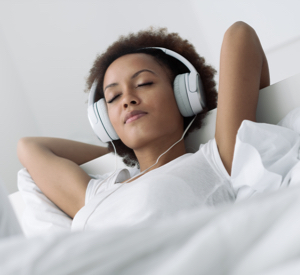
The social distancing and quarantine orders that have changed how people around the world live their daily lives have left many people looking for ways to fill their time. While sedentary behaviors increase since we are stuck at home, physical activity plays an important role in avoiding a sedentary lifestyle. However, there is another important exercise to practice that doesn’t include working out at all––that’s sleep.
Many people forget the essential role of quality sleep in their health and their quality of life, which is why we’re wanting to remind all to revisit the benefits of adequate and quality sleep. There is no better time to improve your sleeping habits and thereby take important steps towards improving your health.
Here is what you need to know about the value of getting enough rest:
Why Sleep Is Important
Getting enough sleep may impact nearly every aspect of your life, from your mental health to your safety. People who fail to get enough sleep will often find themselves more prone to distractibility and slower reaction times, which can add up to an increase in accidents.
From a mental health standpoint, sleep plays a critical role. One study found that as many as 90 percent of those who struggle with depression also report that they are not satisfied with their quality of sleep. Additionally, those who suffer from sleep disorders, such as insomnia, were also significantly more likely to have mental illnesses, such as depression. As you can see, the link between sleep and mental health is strong.
When it comes to your physical health, sleep also appears at the forefront. Research shows that there is a link between insufficient sleep and obesity in adolescents. It’s been observed that those sleeping for short durations had twice the risk of becoming obese compared with those sleeping for long durations.
For children and teenagers, whose bodies continue to grow, sleep plays a crucial role in development so it is so important to start practicing healthy sleep patterns, which can prime their bodies for learning, managing stress, and staying healthy.
Health Benefits Of Sleep
Given the important role that the full sleep cycle plays in your health, taking the time to improve your sleep habits can do incredible things for your body.
As you work to improve your health, you will find that improving your sleep habits can help you get your body to a healthy weight by balancing your hormones, helping you control your intake of calories, and thereby decreasing your risk of obesity. You can also reduce your likelihood of developing diabetes and the potential complications and health problems that can arise from this condition.
Anyone who wants to improve their athletic performance will also find that getting a full night’s rest will help them. You will find it easier to boost your cardio health and make it easier for you to perform at your personal peak levels. In a study with basketball players, participants noticed a significant improvement in their speed, accuracy, reaction times, and mental well-being when extending their sleep time.
Even a small loss of sleep has been shown to impair immune function. Another study confirms that getting 8 hours or more of sleep can reduce your chances of developing a cold.
Another benefit you may not have known about that can give praise to sleep is the accuracy of recognizing human emotions. A study that investigated the impact of sleep deprivation showed signs of an inability to recognize the intensity of human facial emotions. Such findings suggest that sleep loss disrupts affective neural systems and social cues.
Getting Enough Sleep
The amount of sleep we need changes dramatically as we grow up. Anyone who has spent time with babies and young children knows that they need a lot of sleep. In fact, infants between 4 and 12 months need as much as 12-16 hours of sleep a day. Toddlers between 1 and 2 years old need between 11 and 14 hours of sleep each day.
By the time a child reaches preschool age––between 3 and 5 years old––should get between 10 and 13 hours of sleep, and elementary schoolers––between 6 and 12 years old––should get between 9 and 12 hours of sleep each day.
Teenagers, whose bodies continue to grow, still need more sleep than the average adult, so make sure that the teens in your life get between 8 and 10 hours of sleep each day. By the time a person reaches adulthood, their bodies generally need between 7 and 8 hours of sleep each day.
Sleep Deprivation Signs And Symptoms
If you find yourself experiencing any of the following symptoms, you may be sleep-deprived and need to take a close look at your sleeping habits.
- You feel tired throughout the day. For example, you may feel like you want to doze off easily while watching TV.
- You do not feel refreshed when you wake up in the morning
- You have trouble thinking or making decisions
- You have a slow reaction time or find yourself making more mistakes
- You experience an increase in forgetfulness
- If you have a child, they may struggle to pay attention or be hyper
- Children can also experience an increase in mood swings or simply poor moods from being sleep deprived
How Tracking Your Sleep Can Help You
A good way to work on the improvement of your sleep, and gain an accurate picture of the state of your sleeping patterns, is to track your sleep. Though tracking your sleep won’t instantly cure your sleep-deprivation altogether, this will help you gain some insight into your sleeping routine.
On top of excellent trainers and destination workouts to keep you busy at home, iFit® provides you with a wealth of helpful information to help you best understand your sleep progress and what you can do to improve your sleep health.
The iFit app will not only track how long you sleep but it will also help you automatically adjust your fitness routines and goals to reflect your sleep needs. The device can remind you to go to bed when needed so you can get the recommended amount of sleep, and alarms are fully customizable––making it easy to adjust your personal preferences and fitness goals.
More Sleeping Tips To Improve Your Health
In addition to tracking your sleep cycles and getting personalized recommendations from iFit, some additional sleeping tips include:
- Make sure you get ample exercise throughout the day.
- Go to bed and wake up at a consistent time each day, even on the weekends.
- Avoid nicotine and caffeine, particularly in the afternoons.
- Avoid screens and heavy meals for a few hours before sleep. Instead, focus on restful activities.
Sleep plays an enormous role in our health. As you find yourself with your regular routine disrupted with the various social distancing rules, take the time to try and improve your sleep health, setting yourself up for better overall health moving forward.
DISCLAIMER: This post is not intended to replace the advice of a medical professional. The above information should not be used to diagnose, treat, or prevent any disease or medical condition. Please consult your doctor before making any changes to your diet, sleep methods, daily activity, or fitness routine. NordicTrack assumes no responsibility for any personal injury or damage sustained by any recommendations, opinions, or advice given in this article. Always follow the safety precautions included in the owner’s manual of your fitness equipment.
IFIT DISCLAIMER: iFit requires an internet connection and wifi to function. You will be required to provide your credit card information upon sign-up for iFit. Your Commitment Period may be month-to-month or twelve (12), eighteen (18), or thirty-six (36) months, depending on your agreement. Terms shall apply to your iFit use and subscription during your Commitment Period and any subsequent Renewal Term. Unless you cancel your account or notify us at least twenty four (24) hours prior to the expiration of your commitment period that you do not wish to renew your subscription, your iFit subscription will automatically renew for an additional month, one (1) year, or two (2) year period, as applicable, for the same duration as your initial commitment period (“The Renewal Term”), and you authorize us to bill the then-applicable membership fee and any taxes to the payment method we have on record for you.
Sources:
https://www.ncbi.nlm.nih.gov/pmc/articles/PMC7031771/
https://www.medicalnewstoday.com/articles/325353
https://www.nhlbi.nih.gov/health-topics/sleep-deprivation-and-deficiency
https://www.ncbi.nlm.nih.gov/pubmed/16259539
https://www.ncbi.nlm.nih.gov/pubmed/25128225
https://www.ncbi.nlm.nih.gov/pmc/articles/PMC5037605/
https://onlinelibrary.wiley.com/doi/abs/10.1111/obr.12245
https://www.sleepfoundation.org/articles/teens-and-sleep
https://www.ncbi.nlm.nih.gov/pubmed/15851636
https://www.ncbi.nlm.nih.gov/pubmed/21731144
https://www.ncbi.nlm.nih.gov/pubmed/19139325
https://www.ncbi.nlm.nih.gov/pubmed/20337191
https://www.hopkinsmedicine.org/health/wellness-and-prevention/do-sleep-trackers-really-work
https://www.nordictrack.com/learn/ifit-help-get-started-ifit/




